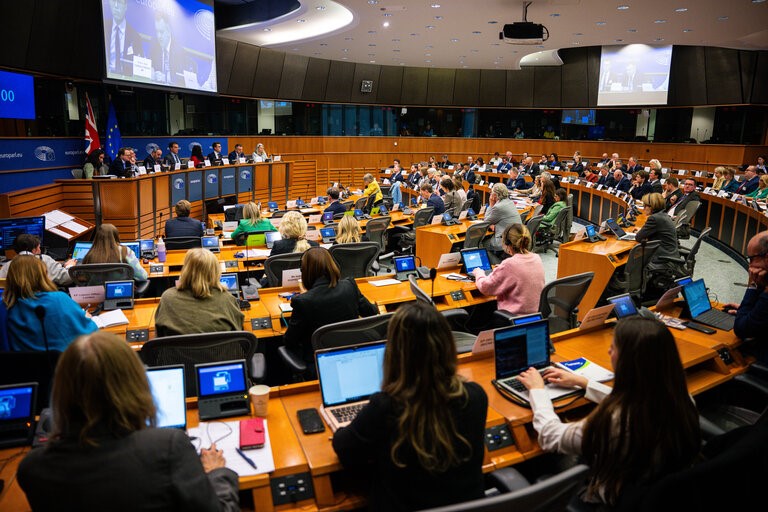Brexit & Beyond newsletter
24 March 2025
Welcome to the 24 March 2025 Brexit & Beyond newsletter
Last week the fifth meeting of the EU-UK Parliamentary Partnership Assembly was held in Brussels on 17 and 18 March.
The European Parliament’s Committee on International Trade heard from Maroš Šefčovič, Commissioner for Trade and Economic Security, Interinstitutional Relations and Transparency on Thursday as part of an exchange of views on the EU response to the US trade policy.
The UK government updated its guidance for sending parcels to and from Northern Ireland which states that new arrangements as set out in the Windsor Framework will now take effect from 1 May 2025.
At Westminster, the first public meeting of the House of Lords Northern Ireland Scrutiny Committee took place on Wednesday. It took evidence for its inquiry on Strengthening Northern Ireland’s voice in the context of the Windsor Framework.
Last Thursday the Northern Ireland Assembly Committee for Agriculture, Environment and Rural Affairs received departmental briefings on two common frameworks.
- 5th EU-UK Parliamentary Partnership Assembly
- EU-US Trade Relations
- Sending parcels to and from Northern Ireland
- Data Adequacy
- Strengthening Northern Ireland’s Voice in the context of the Windsor Framework
- Common Frameworks
- The Trade Remedies Authority
- Inter-parliamentary Finance Committee Forum
- Other news
5th EU-UK Parliamentary Partnership Assembly
As we reported last week, the fifth meeting of the EU-UK Parliamentary Partnership Assembly (PPA) took place in Brussels on 17 and 18 March. Members exchanged views on the Future of EU-UK foreign and security policy cooperation, Youth Opportunities, and Trade, customs and sanitary and phytosanitary measures.
 The fifth meeting of the EU-UK Parliamentary Partnership Assembly in Brussels
The fifth meeting of the EU-UK Parliamentary Partnership Assembly in Brussels
The Assembly was addressed by Commissioner Maroš Šefčovič and Nick Thomas-Symonds MP (Minister for the Constitution and European Union Relations) who gave an update from the Partnership Council.
On Tuesday, the Assembly discussed a range of issues including trade relations and opportunities for young people. Delegates also heard reports on the topics explored during Monday’s break-out sessions, including cooperation around artificial intelligence, energy and climate, and financial services.
Ahead of the UK-EU Summit on 19 May, the Assembly made a recommendation on strengthening the EU-UK partnership, calling greater cooperation on youth opportunities, progress towards Net Zero, and efforts to reduce barriers to trade. The PPA also called for greater cooperation in security and defence, including intensifying efforts to combat disinformation. In the Joint Statement, PPA Co-Chair, Sandro Gozi MEP (France, Renew) said:
“This first PPA meeting of the new term was an excellent occasion to set out a renewed commitment to work with our parliamentarian colleagues from the UK, and to set out concrete areas where we can deepen our cooperation, so providing extra input to the coming EU-UK Summit in May 2025. We fully understand the importance of fully implementing the existing EU-UK Trade and Cooperation Agreement to strengthen mutual trust and as a basis to enhance our partnership. These discussions with our UK colleagues have been warm, constructive and augur well for the coming years.”
PPA Co-Chair Marsha de Cordova MP (UK, Labour) said: “It is great to be in Brussels working together with our nearest allies to address the pressing challenges we both face, and issues of mutual agreement and benefit. This has been a positive and hopeful moment for the PPA. We look forward to hosting the next PPA at Westminster in November.”
EU-US Trade Relations
On Thursday, the European Parliament’s Committee on International Trade heard from Maroš Šefčovič, Commissioner for Trade and Economic Security, Interinstitutional Relations and Transparency as part of an exchange of views on the EU response to the US trade policy. Commissioner Šefčovič said the EU was “considering to align the timing of the two sets of EU countermeasures, so we can consult with member states on both lists simultaneously.”
The European Commission had initially planned to bring back 2018 tariffs on US goods starting on 1 April, in response to US 25% tariffs on steel and aluminium imports which were imposed on 12th March. Along with that, a new set of countermeasures was planned for mid-April.
Commissioner Šefčovič explained that the EU is now looking to sync the timing of both sets of countermeasures, so it can consult with member states on both sets of tariffs at the same time. This delay also gives the EU more time to continue talks with the US.
If those negotiations don’t lead to an agreement, the EU will "recalibrate" its response, considering the new tariffs the Trump administration plans to impose on 2 April. Commissioner Šefčovič emphasised that this approach ensures the EU’s response is “firm, proportionate, robust, and well-calibrated,” while also keeping the EU united and addressing concerns in affected industries.
Sending parcels to and from Northern Ireland
UK government guidance, updated last Wednesday, states that new arrangements as set out in the Windsor Framework will now take effect from 1 May 2025.
 New arrangements for sending parcels to and from Northern Ireland will take effect from 1 May 2025
New arrangements for sending parcels to and from Northern Ireland will take effect from 1 May 2025
Parcel Sending Requirements
Businesses or consumers in Great Britain sending a parcel by direct transport to an individual residing in Northern Ireland for personal use, or a consumer in Great Britain returning goods to a business in Northern Ireland will need to supply their parcel carrier with information. For example:
- a description of the item inside the parcel
- whether they are a private individual or business.
The Joint Committee established under Article 164(1) of the Withdrawal Agreement has said that the that EU is satisfied with the relevant networks, information systems and databases for the UK parcels system under these new arrangements.
Customs Declarations for Business-to-Business Shipments
Business-to-business parcels sent from Great Britain to Northern Ireland will require customs declarations for the first time. This means businesses must complete necessary paperwork to comply with customs requirements.
Data Adequacy
Last Tuesday the European Commission proposed to adopt an extension of the two 2021 adequacy decisions with the UK for of six months. With this extension, the free flow of data with the UK would be maintained until 27 December 2025. It said this will allow time for the legislative process on the UK’s Data Bill to conclude. Following its conclusion, the Commission said it will assess the new legal framework and decide on its adequacy. In the meantime, it said the UK data protection rules that were found adequate in 2021 remain in place and continue to apply to data transferred from the EU.
Commissioner for Democracy, Justice, the Rule of Law, and Consumer Protection, Michael McGrath, said: “The adequacy decisions are key to our relationship with the UK. They ensure data can flow freely and safely, which is crucial for trade, justice, and law enforcement cooperation. Our proposal will allow the Commission to assess whether to renew these decisions based on a stable legal framework, while keeping data flows to the UK uninterrupted.”
Commenting on X, Anthony Soares, Director at the Centre for Cross Border Studies said: “This is crucial for the continued cross-border transfer of data, enabling North-South cooperation on the island of Ireland, including emergency services and health cooperation.”
The draft extension decisions will now be transmitted to the European Data Protection Board for its opinion, as part of the adoption procedure. Once approved, the extension will be valid until 27 December 2025.
Strengthening Northern Ireland’s Voice in the context of the Windsor Framework
The first public meeting of the House of Lords Northern Ireland Scrutiny Committee took place on Wednesday 19 March. It took oral evidence for its first inquiry on Strengthening Northern Ireland’s voice in the context of the Windsor Framework from a panel of academic and legal experts. This inquiry will take full account of the published evidence taken by the former House of Lords European Affairs Sub-Committee on the Windsor Framework in May 2024.
Asked to assess the extent to which the voices of Northern Ireland politicians, officials and stakeholders are currently being heard in the context of the Windsor Framework, Roderick Crawford (senior researcher at Policy Exchange) noted that inquiries undertaken by the Windsor Framework Democratic Scrutiny Committee, pick up “a good number of stakeholder interests” as they relate to specific EU regulations.
Dr Clare Rice (University of Edinburgh) observed that the novel set of arrangements in place under the Windsor Framework allow numerous opportunities for stakeholder engagement that are not being fully harnessed. She identified that the challenge with this set of arrangements lies in their complexity, making it difficult to pinpoint where the opportunities could be most effectively utilised.
Regarding complexity, George Peretz KC BL (Barrister at Monckton Chambers) said that keeping up to date with EU law, understanding what it is and how it is changing is a “major task”.
Common Frameworks
Last Thursday the Committee for Agriculture, Environment and Rural Affairs received departmental briefings on two common frameworks:
- The Ozone Depleting Substances (ODS) and Fluorinated Greenhouse Gases (F-gases) UK Common Framework
- The Developing and Setting of Best Available Techniques (BAT) Provisional UK Common
Common Frameworks are being developed in policy areas which were previously governed by EU law and which intersect with devolved competence. The principles for establishing Common Frameworks were agreed by the UK and devolved governments. They aim to ensure a common approach is taken by devolved administrations in these areas and are being established to ensure the functioning of the UK internal market, while acknowledging policy divergence.
The ODS and F-gases UK Common Framework
The Committee heard that the ODS and F-Gases Provisional Common Framework was laid in the UK Parliament in February 2022 and published as a Command Paper. It is an expression of political commitment but are not intended to be legally binding or enforceable. They are comprised of a Concordat and a Framework Outline Agreement which together state the agreed governance arrangements and cooperative decision-making processes in relation to F-gas and ODS.
Officials confirmed there have been no changes to the Framework itself since its initial publication in 2022 and to date no major disputes have arisen.
The next stage in the Framework’s development process is for parliamentary scrutiny to take place in all four UK legislatures. Once the AERA Committee and all the UK Devolved legislatures have finished their examination of the provisional F-gases and ODS Common Framework, policy officials across the UK will assess the feedback received and make any changes to the documents that are required.
The Developing and Setting of Best Available Techniques (BAT) Provisional UK Common Framework
Before it exited the EU, the UK helped develop EU Best Available Techniques (BAT) standards. Under the Windsor Framework, Northern Ireland still follows EU rules for large combustion plants in the all-island Single Energy Market but aligns with UK policy for other industries. While industrial emissions policy is devolved, a UK-wide approach ensures consistency for businesses.
This Common Framework sets out how UK officials collaborate on regulating industrial emissions, following principles agreed in 2017. It includes a governance structure with the Standards Council (strategic oversight), a Regulators Group, a Small and Medium Industry Sub-Group, and sector-specific Technical Working Groups. Disputes first go to the UK Air Quality and Industrial Emissions Governance Group and can escalate to the Senior Officials Programme Board or the Inter-Ministerial Group if needed.
This Common Framework, like the ODS and F-gases UK Common Framework, was laid before Parliament in February 2022 and remains unchanged. No major disputes have arisen so far. The next step is parliamentary scrutiny across the four UK legislatures, after which officials will consider feedback and update the Framework as necessary. It will be reviewed every three years or sooner if significant issues arise.
The Trade Remedies Authority
The Trade Remedies Authority (TRA) is the UK’s independent body for investigating and recommending trade remedies. This week it initiated the last review of all 43 measures carried over to the UK following its departure from the EU. It announced this has been completed ahead of schedule and means the review of all relevant EU trade measures are now either complete or underway.
The TRA said its focus “now fully shifts to defending UK industry against new and emerging unfair international trading practices and supporting the government with the pressures of a rapidly changing and complex global trade environment.”
In reviewing the EU’s transitioned measures, the TRA has advised the UK government which trade remedy measures the UK should keep as they are, which should be removed (because they don’t affect UK industry), and which should be changed to better protect the UK’s economic interests.
It records that since 2020 when the TRA began its programme to review the transitioned measures:
- 3 trade measures on alloy wheels, stainless steel bars and rods and Category 2 steel products have been revoked completely;
- 12 trade measures covering such industries as e-bikes, biodiesel, tyres, ceramic tiles and glass fibre have been amended to suit the UK’s need better; and
14 trade remedy measures have been maintained as they were when the UK was part of the EU, as the trading conditions were assessed as not significantly changed for products such as certain steel products and rainbow trout to warrant a new tariff.
Inter-parliamentary Finance Committee Forum
Last Wednesday, the Northern Ireland Assembly’s Committee for Finance hosted their counterparts from the devolved legislatures at the fourth meeting of the Inter-parliamentary Finance Committee Forum at Parliament Buildings. Members took the opportunity to discuss common challenges, collaborate, and exchange best practices.
 L-R Matthew O’Toole MLA, Chair, Northern Ireland Assembly Finance Committee, Peredur Owen Griffiths MS, Chair, Senedd Cymru Finance Committee, Kenneth Gibson MSP, Convener, Finance & Public Administration Committee and Diane Forsythe MLA, Deputy Chair, Finance Committee
L-R Matthew O’Toole MLA, Chair, Northern Ireland Assembly Finance Committee, Peredur Owen Griffiths MS, Chair, Senedd Cymru Finance Committee, Kenneth Gibson MSP, Convener, Finance & Public Administration Committee and Diane Forsythe MLA, Deputy Chair, Finance Committee
The Forum had informal sessions with Darren Jones MP, Chief Secretary to the Treasury (online), John O’Dowd, NI Executive Finance Minister and Sir Robert Chote, Chair of the NI Fiscal Council.
The three Committees also shared updates regarding their respective work programmes, particularly focusing on areas of common interest which might be explored more fully in the future.
Other news
- Writing for UK in a Changing Europe, Max Becker, Johanna Flach and Dr. Nicolai von Ondarza explore pathways to strengthen UK-EU defence cooperation.
- The Special EU Programmes Body announced last week that a combined total of €20,984,992.96 of PEACEPLUS funding has been awarded to three projects focussing on a cross-border collaborative approach to the management and improvement of water quality in Northern Ireland and the border counties of the Republic of Ireland.
- The European Commission will decide whether to definitely scrap its planned liability rules for artificial intelligence systems by August, a Commission official told lawmakers in the European Parliament on Tuesday.
- At an informal debate in the European Parliament last week, EU officials and industry leaders discussed the upcoming Circular Economy Act, emphasizing regulatory simplification and the need for a unified market for recycled materials.
- On Wednesday, the European Commission set out its plan to raise €800 billion through loans and debt to help EU countries purchase much-needed defence equipment, with a preference for EU-made gear. In a White Paper outlining the bloc's long-term umbrella defence strategy, 'Readiness 2030', the Commission advises EU countries to invest in continent-wide programmes to reduce their continued reliance on US capabilities.
- The European Commission pressed ahead with enforcement action against Apple and Alphabet, Google’s parent company, two of the world’s five largest companies by stock market value, accusing them of breaking the EU Digital Markets Act (DMA).
- The UK government said on Thursday it is actively considering the case for linking its Emissions Trading System with the European Union's carbon market ahead of a UK-EU Summit in May.
- The Telegraph reports that European Parliament officials are considering a €20 million plan for the monthly removal of scaffolding to keep its debating chamber open during renovation works.




